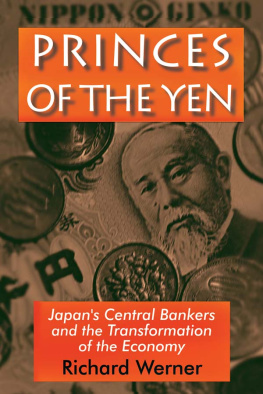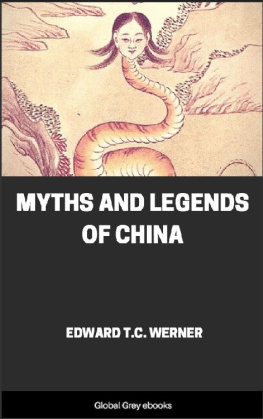Werner - Princes of the Yen
Here you can read online Werner - Princes of the Yen full text of the book (entire story) in english for free. Download pdf and epub, get meaning, cover and reviews about this ebook. year: 2015,2003, publisher: Taylor and Francis, genre: Politics. Description of the work, (preface) as well as reviews are available. Best literature library LitArk.com created for fans of good reading and offers a wide selection of genres:
Romance novel
Science fiction
Adventure
Detective
Science
History
Home and family
Prose
Art
Politics
Computer
Non-fiction
Religion
Business
Children
Humor
Choose a favorite category and find really read worthwhile books. Enjoy immersion in the world of imagination, feel the emotions of the characters or learn something new for yourself, make an fascinating discovery.
Princes of the Yen: summary, description and annotation
We offer to read an annotation, description, summary or preface (depends on what the author of the book "Princes of the Yen" wrote himself). If you haven't found the necessary information about the book — write in the comments, we will try to find it.
Princes of the Yen — read online for free the complete book (whole text) full work
Below is the text of the book, divided by pages. System saving the place of the last page read, allows you to conveniently read the book "Princes of the Yen" online for free, without having to search again every time where you left off. Put a bookmark, and you can go to the page where you finished reading at any time.
Font size:
Interval:
Bookmark:
PRINCES OF THE YEN
Comments on the Japanese edition of Princes of the Yen:
A powerful work.
Eisuke Sakakibara, ex-Vice Minister of Finance
Weekly Economist, Tokyo
This is no ordinary economics book. Readers will find the curtains pulled away from their eyes. Given the time scale coveredthe whole of the twentieth centuryand its broad scopelooking at central bankers actions worldwidethis superb book will make you marvel at how fascinating economics really is. Richard Werner could see through the Bank of Japans smokescreens. The process of disclosing all these facts step by step is as gripping as a thriller. His analysis has been highly appraised internationally, being prominently covered in the Economist and read by Federal Reserve chairman Alan Greenspan.
Takashi Tachibana, author of Shukan Bunshun
This thought-provoking book sheds light on the masterminds of Japans economic policies. The author gives stunning accounts of how a handful of the BoJs elite distorted the nations financial policies with a view to reforming the countrys economic structure.
The Asahi Shimbun, Tokyo
The book deals not just with economic problems, but also unmasks the true causes and power brokers behind those very problems. It depicts the BoJ princes clandestine battle to revive the American-style liberalized economy, as it existed in the Japan of the 1920s, and to dismantle the controlled war economy, which enabled the post-war high growth.
The Mainichi Newspaper, Tokyo
This book makes for a fascinating read. Werner says the claims by the BoJ that they are doing all they can to stimulate a recovery by lowering interest rates are just not true. He goes as far as including a mafia-like list of names and provides evidence about how Sasaki, Maekawa, Mieno and soon-to-be installed Toshihiko Fukui have in an unbroken line been trying to control Japan. I first met the author of this thought-provoking book eleven years ago. He already was a famously accurate strategist, using his analysis to forecast stock market movements with a high degree of precision.
Kiyoshi Imai, Professor of Economics, Tokyo
Legitimate criticism of the Bank of Japan.
Kazuo Ijiri, Voice, Tokyo
We are all baffled at why on earth Japans recession has continued for over ten years. Countless scholars have come and gone explaining the causes and remedies for the recession. We should seriously heed this authors warnings.
Yoichi Masuzoe, Member of the House of Councilors,
Professor of International Politics
Denki Shinbun, Tokyo
PRINCES OF THE YEN
Japans Central Bankers and the Transformation of the Economy
Richard A. Werner



First published 2003 by M.E. Sharpe
Published 2015 by Routledge
2 Park Square, Milton Park, Abingdon, Oxon OX14 4RN
711 Third Avenue, New York, NY 10017, USA
Routledge is an imprint of the Taylor & Francis Group, an informa business
Copyright 2003 Taylor & Francis. All rights reserved.
No part of this book may be reprinted or reproduced or utilised in any form or by any electronic, mechanical, or other means, now known or hereafter invented, including photocopying and recording, or in any information storage or retrieval system, without permission in writing from the publishers.
Notices
No responsibility is assumed by the publisher for any injury and/or damage to persons or property as a matter of products liability, negligence or otherwise, or from any use of operation of any methods, products, instructions or ideas contained in the material herein.
Practitioners and researchers must always rely on their own experience and knowledge in evaluating and using any information, methods, compounds, or experiments described herein. In using such information or methods they should be mindful of their own safety and the safety of others, including parties for whom they have a professional responsibility.
Product or corporate names may be trademarks or registered trademarks, and are used only for identification and explanation without intent to infringe.
Library of Congress Cataloging-in-publication Data
Werner, Richard A., 1967
Princes of the Yen : Japans central bankers and the transformation of the economy / by
Richard A. Werner.
p. cm.
An East Gate Book.
Includes bibliographical references and index.
ISBN 0-7656-1048-5 (alk. paper); ISBN 0-7656-1049-3 (pbk. : alk. paper)
1. Banks and banking, CentralJapan. 2. Monetary policyJapan. 3. JapanEconomic policy1945- I. Title.
HG3326 .W476 2003
332.110952dc21 2002030900
ISBN 13: 9780765610492 (pbk)
ISBN 13: 9780765610485 (hbk)
To Romi
| Tables |
| Figures |
In January 2001, the ambassador to Japan of a European country told me about his recent New Years Eve party at his residence in Tokyo. Among the guests was a high-ranking official from Japans Ministry of Finance (MoF). Most guests were in a joyful mood. They looked forward to the dawn of the twenty-first century. Champagne was flowing and the party was in full swing. But not everyone was happy:
I noticed, the ambassador told me, as the clock approached midnight, this gentleman seemed to be getting sadder and sadder. He was from the Ministry of Finance, and he looked really down. I wondered what the problem was. It was most unusual, I thought. Finally, as the clock struck midnight, he came up to me and told me, in a very sad voice:
Now its all over.
What do you mean? I asked him.
We lost our name, he replied. Its over. From January 2001, kurash [the Japanese name for Ministry of Finance] is gone.
I tried to console him by saying, Well, but its just the name. You shouldnt worry too much about a name. The ministry is still there. You still have power and influence.
But he said: If they at least had left us the name They had already taken away our power. Its gone.But that they would also take away our name He shook his head despondently.
Not noticed by many English-speakers, to whom the old kurash was simply known as the Ministry of Finance, a long and illustrious history ended abruptly in January 2001. For much of the past century, at least according to the letter of the law, the kurash had been the most powerful institution in Japan. Its grand old name is more correctly translated as Great Storehouse Ministry or Great Treasury Ministry and its history goes back to the time when taxes were paid in kind and the ministry literally was the storehouse of the rice that would arrive from all over the country.
The general public has not shed any tears over the demise of kurash. MoF, the Finance Ministry, is generally held responsible for the most flagrant economic mismanagement in modern peacetime Japanese history: the creation of the bubble of the 1980s and the long recession that followed in the 1990s.
The recession had produced the general conviction that Japans old economic system, headed by its leading bureaucracies, did not work anymore and thus had to be reformed drastically. Most commentators now claim that structural changes are badly needed. Prime Minister Junichiro Koizumis most repeated slogan is No recovery without structural reform. Senior members of the Japanese central bank have been calling for far-reaching structural reform on an almost daily basis. These voices claim that liberalization, deregulation, and privatization, in other words, the introduction of U.S.-style capitalism, is necessary for Japans economy to recover.
Next pageFont size:
Interval:
Bookmark:
Similar books «Princes of the Yen»
Look at similar books to Princes of the Yen. We have selected literature similar in name and meaning in the hope of providing readers with more options to find new, interesting, not yet read works.
Discussion, reviews of the book Princes of the Yen and just readers' own opinions. Leave your comments, write what you think about the work, its meaning or the main characters. Specify what exactly you liked and what you didn't like, and why you think so.

















